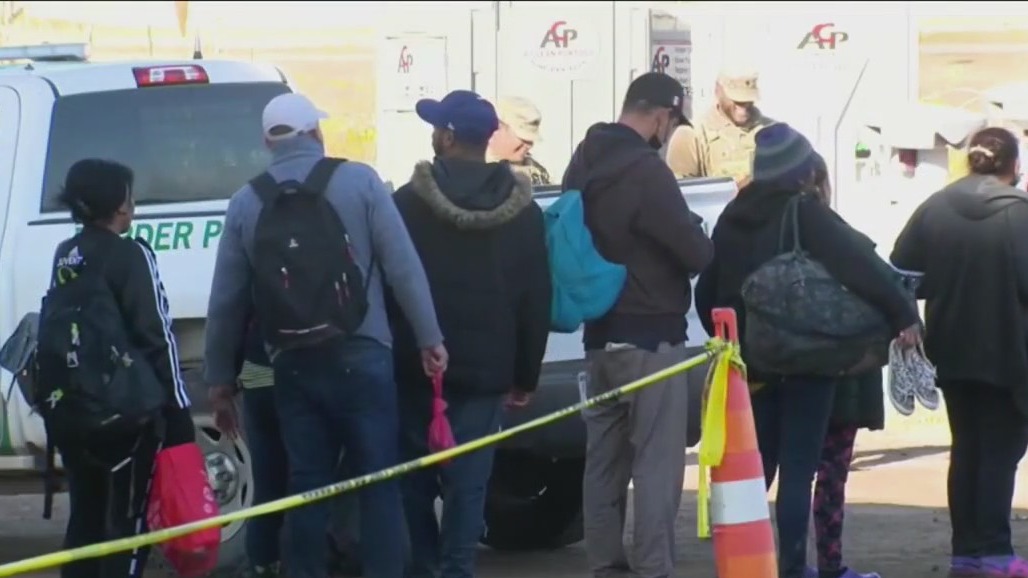Supreme Court ruling on Title 42 casts asylum seekers as 'political tool,' Chicago immigration advocate says

No end in sight for border crisis
The day after the U.S. Supreme Court blocked the Biden Administration's plan to end Title 42, cameras captured migrants continuing to cross into the United States.
CHICAGO - As families seeking asylum in the United States face ongoing threats of being turned away from the border, some have opted to send their children alone, said one Chicago-based immigration advocate.
The U.S. Supreme Court on Tuesday issued a ruling keeping in place the controversial policy called Title 42, which allows the government to turn away certain individuals who have reached the borders to seek asylum.
The policy, which dates back to a 1944 public health law, was enforced by former President Donald Trump in March 2020 to curb the spread of coronavirus.
Unaccompanied minors, however, are exceptions to Title 42.
"We have worked with many children who entered federal custody here in the United States because their parents made that awful and heartbreaking choice to separate from their child so that their child could be safe," said Jennifer Nagda, the policy director for the Chicago-based Young Center for Immigrant Children’s Rights.
SUBSCRIBE TO FOX 32 ON YOUTUBE
Following legal battles, Title 42 immigration reform advocates had expected the policy to be lifted. But 19 states, led by Republican leaders, have taken their case to the high court seeking to keep it in place. The states have argued that the end of Title 42 would create an increase in migration, and it would take a toll on public services.
The Supreme Court will hear arguments on the matter in February.
For those minors who came to the U.S. alone, Tuesday’s decision could mean that their family members will have to wait even longer to try to be possibly reunited, Nagda said. Family reunification could be even more difficult if the family was sent to their country of origin where they faced danger, she said.
Keren Zwick, the director of litigation for the Chicago-based National Immigrant Justice Center, said the high court will be considering a narrow question on whether states can intervene rather than the legality of the policy itself. Still, the outcome could have implications for other immigration-related policies.
"If the federal government isn’t able to set immigration policy because they’re going to always be vulnerable to litigation from states that don’t like those policies, it just makes an already difficult task of fixing the immigration system basically impossible," Zwick said.

Supreme Court upholds Trump-era immigration policy
The Supreme Court is keeping pandemic-era limits on immigration in place indefinitely, dashing hopes of immigration advocates who had been anticipating their end this week.
The organization provides legal representation for asylum seekers, and Zwick said they’ve heard of people who have been turned away at the border and later faced kidnapping or extortion in Mexico.
She said the policy has also hit Black and Brown immigrants hard.
"The policies that take place in the Southern border always disproportionately impact Black and Brown folks," Zwick said. "In this case in particular, we’ve seen the U.S. government roll out policies, for example, for Ukrainians that have allowed them to enter the United States with greater ease while Haitians, as a counter example, to extreme cruelty and removal."
Like the asylum seekers who have in recent months been sent by Republican Texas Gov. Greg Abbott in chartered buses to Democrat-led cities like Chicago, Zwick said those seeking protection in the U.S. are again being used a "political tool."

Venezuelan and Nicaraguan migrants are transferred by agents of the Border Patrol after crossing the Rio Grande river from Ciudad Juarez, Chihuahua state, Mexico to El Paso, Texas, US to ask for political asylum on December 27, 2022. - (Photo by Heri
"It’s very unfair for them and for their safety and for their lives," Zwick said. "And it’s completely antithetical to the U.S.’s obligations to recognize the rights of asylum seekers to come to this country and ask for protection."
Since late August, 3,854 asylum seekers have arrived from Texas to Chicago, according to city officials. Many of those individuals are being temporarily housed in shelters and hotels in Chicago and suburban Cook County.
The Associated Press contributed to this report.
Elvia Malagón’s reporting on social justice and income inequality is made possible by a grant from the Chicago Community Trust.

